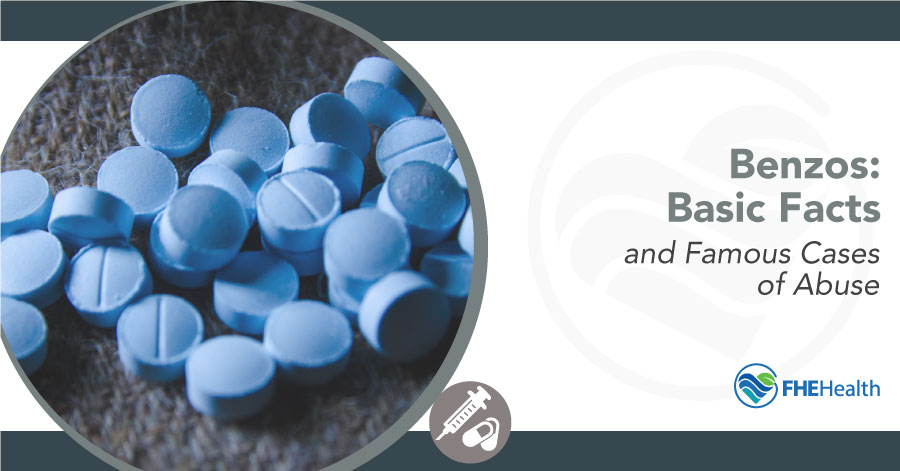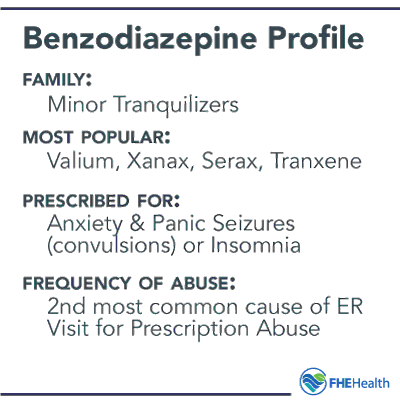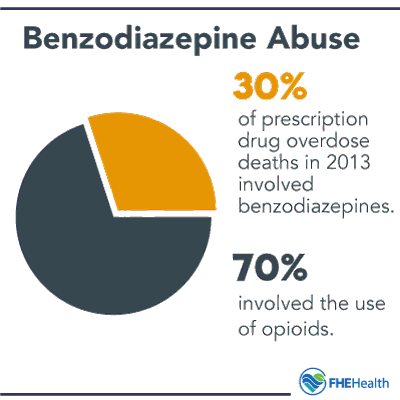
What Are Benzos?
Benzodiazepines, also known as “benzos,” are a class of synthetic prescription drugs that are commonly used to treat both acute and chronic anxiety. First developed in the 1950s, these drugs work by binding to gamma-aminobutyric acid-A, or GABA-A, neurotransmitters within the brain, which helps to desensitize the nerves in the brain.
 As a result, patients who take benzos experience a decrease in symptoms linked to excessive brain activity, such as anxiety, racing thoughts, nervousness, insomnia, and muscle spasms. In some clinical settings, benzodiazepines may also be used to treat alcohol withdrawal.
As a result, patients who take benzos experience a decrease in symptoms linked to excessive brain activity, such as anxiety, racing thoughts, nervousness, insomnia, and muscle spasms. In some clinical settings, benzodiazepines may also be used to treat alcohol withdrawal.
Benzos can also be prescribed as an emergency treatment for epileptic seizures and similar disorders that are linked to excessive nerve activity within the brain. In these situations, the benzodiazepines are often administered via a rectal gel to maximize the absorption of the drugs by bypassing the digestive system.
Common Types and Formulations fof Benzodiazepines
Some of the most commonly known types of benzodiazepines on the market today include:
- Xanax
- Klonopin
- Valium
- Ativan
- Restoril
- Halcion
- Librium
Most benzos are available in both fast-acting and extended-release oral tablets, while some are also formulated to be administered either rectally or as an injection.
Why Are Benzos So Addictive?
 Benzos are among the most addictive prescription drugs on the market today because they provide users with rapid relief from uncomfortable symptoms caused by excessive brain activity. Simply put, they have the ability to make users feel good without impairing their ability to function the way alcohol and other substances can.
Benzos are among the most addictive prescription drugs on the market today because they provide users with rapid relief from uncomfortable symptoms caused by excessive brain activity. Simply put, they have the ability to make users feel good without impairing their ability to function the way alcohol and other substances can.
Not only do they work by suppressing excessive brain activity associated with panic disorders, insomnia, and general anxiety, but researchers have also discovered they can cause a surge in dopamine, the “feel-good” neurotransmitter. This combination of reduced brain activity and the rapid increase in dopamine levels in the brain’s “reward area” makes them exceptionally addictive, even when used on a short-term basis.
Adding to the chemical mechanism of benzos is the fact that they’ve long been considered socially acceptable and medically safe. Unlike street drugs such as heroin and cocaine, these are prescription medications, and this tends to give users and many medical professionals a sense that these drugs are therefore safe. This, combined with the fact that only a few states actually track prescriptions of drugs like Ativan, Klonopin, and Xanax, has made it relatively easy for patients to access benzos.
 Benzo use and abuse among celebrities have been brought into the spotlight recently with the deaths of a number of well-known personalities such as Amy Winehouse and
Benzo use and abuse among celebrities have been brought into the spotlight recently with the deaths of a number of well-known personalities such as Amy Winehouse and 





